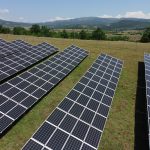Brussels, May 6 – Today, the European Commission announced its long awaited REPower EU Roadmap to phase out Russian fossil fuels and nuclear products. This marks a critical moment for Ukraine and a step towards lasting peace on the European continent.
In 2024, EU imports of Russian fossil fuels amounted to a total of €21.9 bn, surpassing the €18.7 bn of financial aid sent to Ukraine in the same year (according to CREA). While the EU has committed to phase out its Russian dependency, the Roadmap is also a key milestone in advancing the bloc’s broader energy security, transition plans, and climate commitment.
Esther Bollendorff, Senior Gas Policy Coordinator, CAN Europe: “We welcome the Commission’s long-awaited confirmation that phasing out Russian fossil fuels remains a priority, with legally binding measures to follow. However, this is not enough. The EU continues to focus on diversifying fossil fuel suppliers, rather than doubling down on proven solutions like energy and gas demand reduction measures.
Between 2022 and 2024, EU gas demand fell by approximately 100 bcm – twice the remaining volume of imported Russian gas. This shows how effective demand-side measures can be. The EU should focus on replacing fossil fuel boilers, insulating homes, electrifying transport and accelerating renewables -not locking in new fossil deals.
Fossil fuels – whether imported from Russia or elsewhere – expose Europe to price volatility, geopolitical risks and worsening climate impacts. What’s urgently needed is clear legislation to phase out all fossil fuels, with binding phase-out plans and demand reduction targets. Only then we can ensure an affordable and climate resilient energy future for people.”
Tom Lewis, Energy Policy Coordinator, CAN Europe: “After 3 years since the Russian invasion of Ukraine, it is about time that Russian uranium is put under the spotlight. A restriction on all new Euratom contracts with Russia is a good first step, however these measures are unable to change nuclear power’s inherent dilemma – it keeps us dependent on imported uranium.
Too much emphasis is put on diversification of supply, while the attention should be on reducing and phasing out nuclear power as a contribution to building energy security.”



